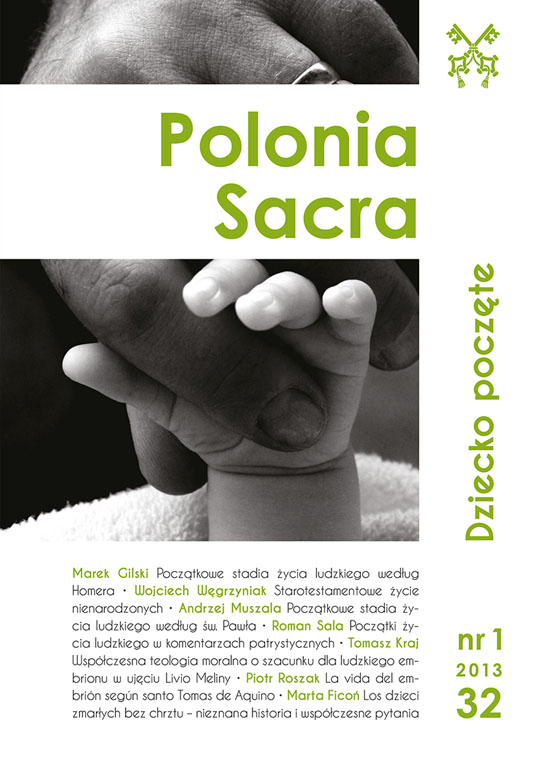Początkowe stadia życia ludzkiego według Homera
DOI:
https://doi.org/10.15633/ps.348Słowa kluczowe:
początkowe stadia życia ludzkiego, Homer, embrionAbstrakt
The article tried to find a response to the question how Homer identified the first stages of human life. The analysis helped to make the following conclusions:
Many Greek terms used to describe human life (αἰών, βίος, ζωή, ϑυμός, μένος, ψυχή) show awareness of ancient Greeks for the rich phenomenon of human life and the difficulties in describing it precisely;
Homer’s works testify to the rising of the terminology connected with human life. Among them we can find the terms referring to the fact of conception (γείνομαι, κυέω, τίκτω, ὑποκύομαι) and birth (γείνομαι, ἐξάγω πρὸ φόως, τίκτω). Homer understands the notion of “embryo” in a quite different way comparing it to the later literature. He refers this term not to a child in the mother’s womb, but to a child already born.
According to Homer’s opinion childbirth does not constitute any significant turning point in human life.
The new life is a result of God’s cooperation with parents.
Pobrania
Opublikowane
Numer
Dział
Licencja
Prawa autorskie (c) 2013 Marek Gilski

Utwór dostępny jest na licencji Creative Commons Uznanie autorstwa 4.0 Międzynarodowe.
Autorzy publikujący w czasopiśmie udzielają jego wydawcy zgody o następującej treści:
- Autor zachowuje autorskie prawa majątkowe do utworu, a jednocześnie udziela wydawcy czasopisma zgody na jego pierwszą publikację w wersji drukowanej i wersji online na licencji Creative Commons Uznanie autorstwa 4.0 Międzynarodowe oraz zgody na wykonywanie opracowań, w tym przekładów.
- Autor ma możliwość udzielania zgody niewyłącznej na opublikowanie utworu w wersji, która ukazała się w czasopiśmie (np. zamieszczenia go w repozytorium instytucjonalnym lub opublikowania w książce), wraz z informacją o jego pierwszej publikacji w czasopiśmie.
- Autor może umieścić swój utwór online (np. w repozytorium instytucjonalnym lub na swojej stronie internetowej) jeszcze przed zgłoszeniem utworu do czasopisma.

